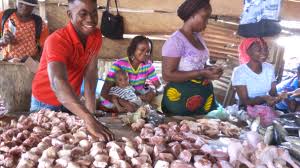By Alfred Kollie Email alfredkolliejr92@gmail.com
A prominent Liberian Economist and former head of the National Investment Commission (NIC), Dr. Somah Paygai Sr. says there is urgent need to speed up the pace of liberalizing and integrating Liberia’s monetary sector.
Dr. Paygai said this will place Liberia’s financial services into the international financial system and the capital market in the country.
Liberia is currently experiencing one of the most serious rise in the currency exchange rate, with the Liberia dollar being exchanged at a rate of nearly 160 to one US dollar, something that has led to a dramatic and prolonged hike in the prices of basic commodities in a country with a dual currency regime in place.

Speaking Wednesday at a one -day policy dialogue on Factors Imparting Liberia’s Exchange Rate Regime, the academic and former NIC boss said the implementation of the new economic development agenda relating to currency stability will require both a national resolve and the political will to reconcile issues of fundamental concern.
According to him, these issues include a wide range of stakeholders including vested groups and advocates.
The dialogue was organized by the Governance Commission (GC) in partnership with the University of Liberia and the Cuttington Graduate School, but was boycotted by implementing government institutions including the Liberia Revenue Authority, the Finance Ministry and the Central Bank of Liberia.
No clear reason was given to the organizers for their absence from Wednesday’s public forum, an official said.

In Dr. Paygai further said: ‘’As parts of the liberalization reform, Liberia with it current economy situation must adapt to the usage of one currency that will lead to the restructuring of the Central Monetary Authority of the country.”
According to the former National Investment Commission’s boss, ‘’to implement Liberia’s new economic development agenda relation to stabilize the country currency needs both a national resolution and the political will.”
He said the structure and System of managing the economy must be overhauled to improve accountability, transparency and efficiency and make fiscal policies relevant and supportive of national economic and social development.
Dr. Paygai, who once served as a member of the Economic Management Advisory Team of Liberia, called on the government and key policy markers consider recommendations by the Governance Commission on the rationalization and continued restructuring.
He said that Liberia cannot achieve any appreciable level of economic progress with an outdated financial system in the country noting that access to markets of different countries are enable and expedited by improve technology in banking and financial Services.
According to the Liberian Economist, Liberia is currently experiencing too much money in circulation which has greater impact than the demand with the money loses its value.
‘’Today, we Liberians find ourselves grappling with the trouble of a dual currency system, the trouble with the dual currency system whether bi-metallic or bi-paper or mixed is that either the rate of exchange between the two currencies is determined by the market, depending on what can or cannot be done with either currency and how or their rate of exchange is manage by monetary authorities,’’ he explained.
The market determined exchange rate, the introduction of a new currency simply increases the amount of liquidity in the system without any other effect, the Liberian Economist explained.
‘’I believe that the tragedy of our Civil Crisis will produce the next great generation of Liberians to defend our country and the world,’’ Dr. Paygai concluded.
The acting Chairman of the GC, Dr. E. Othello Gongar said the dialogue was intended to provide recommendations in addressing the current economic challenges in the country.
Dr. Gongar said the dialogue will provide critical evidence based analysis of factors Imparting Liberia’s foreign Exchange Rate, their effects on the economy and explore suggestions for medium and long-term solutions to the problems.
Participants were drawn from the economic and financial sectors including the MACs banking instructions, development partners, relevant civil society organizations and a cross section of society and academia.
The Panel of Economic experts were asked to address the forum on sub-topics including the Import substitution and value addition, implications on the foreign exchange rate stability.
Other subjects discussed were the Dual currency regime and the global financial outlook, implications on the foreign exchange rate stability and the legalization of capital account liberalization and access to finance, implications of the foreign exchange rate stability.

